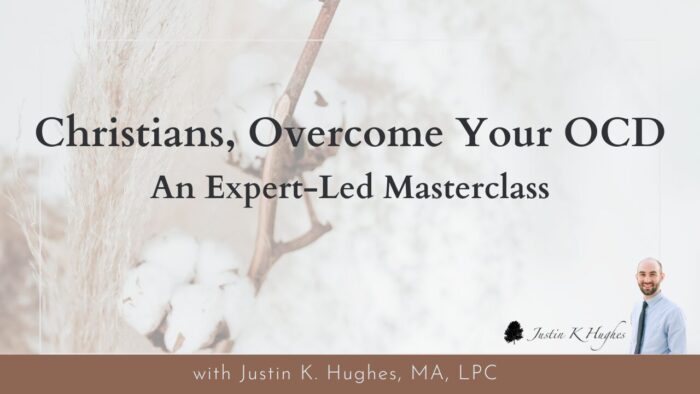
“You need to pray about that.” “Resist those thoughts; they are from the enemy.” “Don’t think on such things.” I often hear confusion from Christians on how to engage- or not engage- with fear based thoughts, urges, and sensations. This led me to do a deep dive into Scripture to see if there are any differences between responding to fear vs. temptation. Spoiler Alert: there are. We must learn to face fear and flee temptation.
Joy* came in to see me because she was getting overwhelmed- having panic attacks and getting stuck in making decisions. Most of all, she was terrified of the doubt that she wasn’t walking with God. These are weighty things to carry. Joy is an incredible woman of faith. Loved ones agreed (though she’d never tell you this). Due to her obsessions and intrusive thoughts, she couldn’t stop compulsively asking God for forgiveness when feeling like she’d sinned, constantly evaluating things as small as the way she walked and the facial expressions she carried when around others. She would often have thoughts that went counter to what she believed: “Maybe your anger is just the same as wanting to kill someone.” “You’re not close to God- you don’t feel His presence.” “Are you sure you are living your life fully for Him?” “Your attraction to other men is lustful- you’re supposed to feel pleasure seeing your husband.” These thoughts and their consequent feelings led to a lot of avoidance- dodging men, running from ‘scary’ Scripture passages, avoiding going out in public.
It is impossible to read very far in the Bible without coming across some variation of “fear not!” It is the most common directive in the Bible- occurring more than any of the following “do nots:”
- Stealing
- Adultery
- Theft
- Lying
- Injustice
- Violence
- Sexual Immorality
You can check out my entire article, “Fear Not” to go deeper into this topic. I could even venture to say that my whole career is dedicated to how we respond to fear. First, here’s a personal back story.
Growing up, I was involved in a Christian subculture that took an oft avoidant stance to things perceived as risky. I remember some varying examples from different people through the years: some condemning rock music and drums, dating, kissing before marriage, alcohol in any way, dancing, mental health medications, and playing cards. Of course, each Christian must develop their conscience and walk with Christ, so I am not here to make decisions for you on any of these topics. There are a lot of decisions in a lifetime that will necessitate flexibility and exhibit differences between believers- they are not all black and white (cf. Romans 14, Galatians 5), though some are. To understand why these often well meaning folks said what they said would require knowing the context. I know many times I have heard believers condemn alcohol for anyone it is out of themselves or loved ones having problems with alcohol- which would be one of the best reasons not to drink! However, we must be careful not to make a rule or law of conscience generalized to everyone that is not specifically laid out for all believers (check out TGC’s article on conscience). Unfortunately, I heard plenty of cautions from people rife with fear.
For Christians, hypervigilance as to spiritual matters is out of place. Vigilance is called for in the things we must be alert about. Hypervigilance is being on edge, fearful, shaky. Before Christ was crucified he prayed that his followers would be protected, but still present in the world (John 17:15). Healthy and spiritually mature individuals have developed discernment of separating good from evil while being present in the world (Hebrews 5:14)- part of growth requires learning how much focus and time to prioritize on any one thing.
Stick with me closely here: this is where I want to delineate between fear and temptation. I believe it’s a crucial difference- one that has led to a lot of personal growth and change along with that of many clients.
Let’s first view some key texts on temptation:
- “What causes quarrels and what causes fights among you? Is it not this, that your passions [literally “pleasures”] are at war within you?” (James 4:1).
- “Flee from sexual immorality” (1 Corinthians 6:18).
- The temptation of Jesus (Matthew 4; Mark 1; Luke 4) found him in a desperate state physiologically while Satan endeavored to tempt him. Jesus’ powerful responses involved quoting Scripture back to Satan (interestingly, Satan was also quoting Scripture, quite literally).
- The famous “Take up the whole armor of God” passage (Ephesians 6:11-18) leaves us with some key phrases: “keep alert” and “we do not wrestle against flesh and blood.”
- Give no opportunity to the Devil (Ephesians 4:27).
- Avoid the craftiness of someone who tries to pull you into cheating on your spouse (Proverbs 7).
- “Watch and pray that you may not enter into temptation. The spirit indeed is willing, but the flesh is weak” (Mark 14:38).
- The righteous “shuts his eyes from looking on evil” (Isaiah 33:15).
With a misappraised lens we might think God would have us constantly eschewing evil, always looking over our backs for sin crouching to get us (Genesis 4:7). Nope. Context is key. There’s a bigger picture.
Both in Bible reading and In CBT (Cognitive Behavioral Therapy) a key thing we do is to look at context- understanding one thing through the larger picture (i.e., for Bible reading, observing before interpreting; in CBT, we assess the larger connection between feelings, thoughts, and behaviors). Here is the broader backdrop for all the above Scripture passages:
- Doesn’t James 4:1 state all our problems are due to our selfish passions (“You desire and do not have, so you murder.”)? No and Yes. Some of our problems are. Back up to the first chapter of James in verse 14: “But each person is tempted when he is lured and enticed by his own desire.” So in 4:7 when it says, “Resist the Devil, and he will flee from you”, it is in this broader context of problematic desires (e.g., don’t steal a new iPhone because you “have to have it”- but you probably don’t have to be constantly aware of not stealing an iPhone if that is not a temptation for you). The reality is that each person will be pulled by certain desires they have (1:14). We don’t have to resist desires we don’t have, or resist things that are not desires. If you’re not an alcoholic and are okay with serving alcohol at the restaurant you are employed at, does this need to be a problem (Romans 14)? Last point I’ll make here- to resist the Devil means that you are resisting the Devil, not some intrusive thought about the Devil or something that you may associate as the Devil (e.g., the number 13, having a bad day somehow means that the Devil was ‘all up in your business’).
- Fleeing sexual immorality requires the person who feels the pull/urge to out-of-bounds pleasure to acknowledge that and respond appropriately. For example, some people never have urges to cheat on their spouse with a coworker. Therefore, they may not have to shift their attention to being on guard against that temptation, unlike the person who might a) have historical problems with flirting/cheating with their coworkers or b) are aware of blossoming desires and urges that can be seen through thoughts and behaviors like fantasizing, flirting, keeping secrets, or oversharing.
- The temptation of Jesus might seem to imply we need to only be quoting Scripture back to temptation. That is one good response! However, that is only one aspect we need (don’t forget that other Scriptures offer additional guidance- for example, prayer isn’t even mentioned during the temptation of Jesus!).
- The ‘keep alert’ type statements in Ephesians 6 might lead to hypervigilance, but we actually see that the progression in 10-20 offers one of the most beautiful, holistic images on how to stand strong: Put on the WHOLE armor- many parts (v. 11). We face way more than what we see; the bigger realities are actually unseen (v. 12). Again, put on the WHOLE armor (v.13). This might be important if it’s mentioned twice. Stand with truth (v. 14). Truth grounds us so we can stand. Cover yourself with righteousness (v. 15). HINT: righteousness is through faith alone and grace alone. Those who belong to God also manifest the works of God. Be made ready by the Gospel, which is good news of peace (v. 15). Use faith to block the attacks of the enemy (v. 16). Put on the helmet of salvation (v. 17), which is a protection from God, not us. We cannot save ourselves- let God protect you in the way only God can. Use the sword of the Spirit (Scripture) (v. 17). Pray at all times in the Spirit, with prayer and earnestness God (v. 18). Keep alert, and pray for other believers (v. 18). Keep praying for those believers specifically sharing the Gospel and ministering to others (v. 18-20).
- 5. In one verse prior to Ephesians 4:27, it says to be angry without sin. This is one of the most clear passages in all the Bible speaking to the role of having an emotion and having thoughts- even strong ones such as experiencing anger- and yet a person can experience without sinning. So to “give no opportunity to the Devil (Ephesians 4:26), we can strongly support that it’s not saying we should be not thinking about difficult things or demonic powers, but rather it’s an issue of what we do with them and how we approach them.
- Proverbs has a lot of cautions towards the adulterous woman. A narrow lens might interpret the exhortations to be only encouraging men- that would miss the whole testimony of the Bible which gives examples of men and women doing good- or evil. In fact, the end of Proverbs (31) extols the incredible virtue of a godly woman. There is no place that ever says “avoid attractive women/men.” It takes wisdom (what the book of Proverbs is about- Proverbs 1:2) to discern a risky situation- and to take appropriate action.
- To “watch and pray” is good advice. In Mark 14, Jesus is about to be betrayed and handed over to the religious elite. Jesus exhibits a rich relationship talking to the Father. In Luke 6:12 he prays all night (right before picking his disciples). John 11:41 was a quick prayer, but set as an example to those listening. Mark 14:36 is an example of expressing emotions and a desire to not have to face what He came to face. Luke 18:1-14 gives a couple parables that encourage persistence in pursuing God through prayer. The larger reality at play, though, is that this was not hypervigilance. It was appropriate communication that was marked at times by connection, teaching, urgency, timeliness, and more at play. Ritualistic prayer gets stuck in a rut and misses the purpose.
- Isaiah 33:15 is not a verse saying to close one’s eyes and suppress information. This is metaphorical as we are also told to be wise as serpents and innocent as doves (Matthew 10:16). Acts 26:18 has Paul reflecting on Christ’s call on his life, stating he was called “to open their eyes, so that they may turn from darkness to light.”
There you go. I hope these key passages have helped identify a trajectory for facing temptation- knowing that hypervigilance or persistent fear is unbefitting God’s will for believers.
What if something I fear is also a desire? Or becoming a desire? This is a common question I get when helping clients call out and lean into their fears in therapy.
As mentioned concerning the 2nd passage above (1 Corinthians 6:18), sometimes people run into things they simultaneously fear and are a risk at the same time (egosyntonic and egodystonic). Maybe it’s abusing substances for the addict, fear of harming a child while also having actual anger outbursts, or being scared by unwanted thoughts on suicide for the depressed person who sometimes contemplates suicide. This gets a little tricky, and I have to admit, makes the process in therapy a little more challenging. I like a good challenge! It’s important to do a little more assessment and separate out the two domains. On this topic, let me just say that’s what makes therapy all the more important. Get a professional outside of yourself who can help you separate the two and know how to address both sides of the problem- a mixed desire with simultaneous lack of desire to act on a behavior.
A final word. Deuteronomy 31:8: “ It is the Lord who goes before you. He will be with you; he will not leave you or forsake you. Do not fear or be dismayed.”
Being overcome with fear is not what God desires for His children. I myself and a lot of fellow Christians can be so torn up with fear when facing uncertainty or a perceived threat, forgetting that this fear itself is not from God.
Fear manifests in all sorts of ways- ways that are often overlooked and (sometimes applauded!) by fellow believers in areas such as perfectionism (think of the workaholic in a church setting), over-thinking and analyzing (the person who appears to study the Bible often but are obsessed with minute details and not relationship), and rugged self-reliance (not submitting to authority, relying on community, and otherwise being a ‘lone ranger’). We can often call these things high standards, thoughtful, and independent. Insomuch as any of these things lead to a lack of dependence and faith on God through fear, we have entered into another formidable foe in and of itself! Whether it comes from our brains (the flesh), other influences (the world), or the enemy (the Devil) (Ephesians 2:2-3).
Fear and temptation are two different things. Responding to them requires a different stance. However, they can easily be confused with the other. My prayer for you today, my friend, is that you would know the freedom and joy that is in Christ the solid rock, who will complete the work He has started in you (Philippians 1:6).
*Joy is not this client’s given name and is a composite of case information to protect patient confidentiality. There are thousands of cases very similar to this.
Every reference in this article is ESV.








Leave a Reply